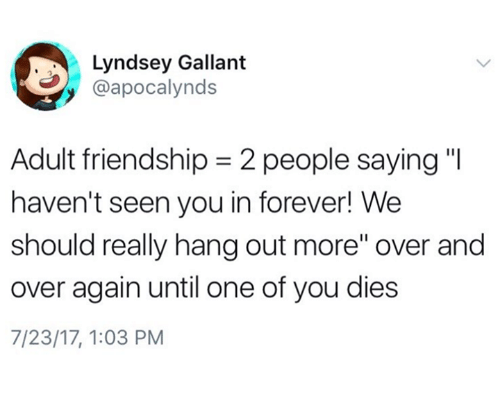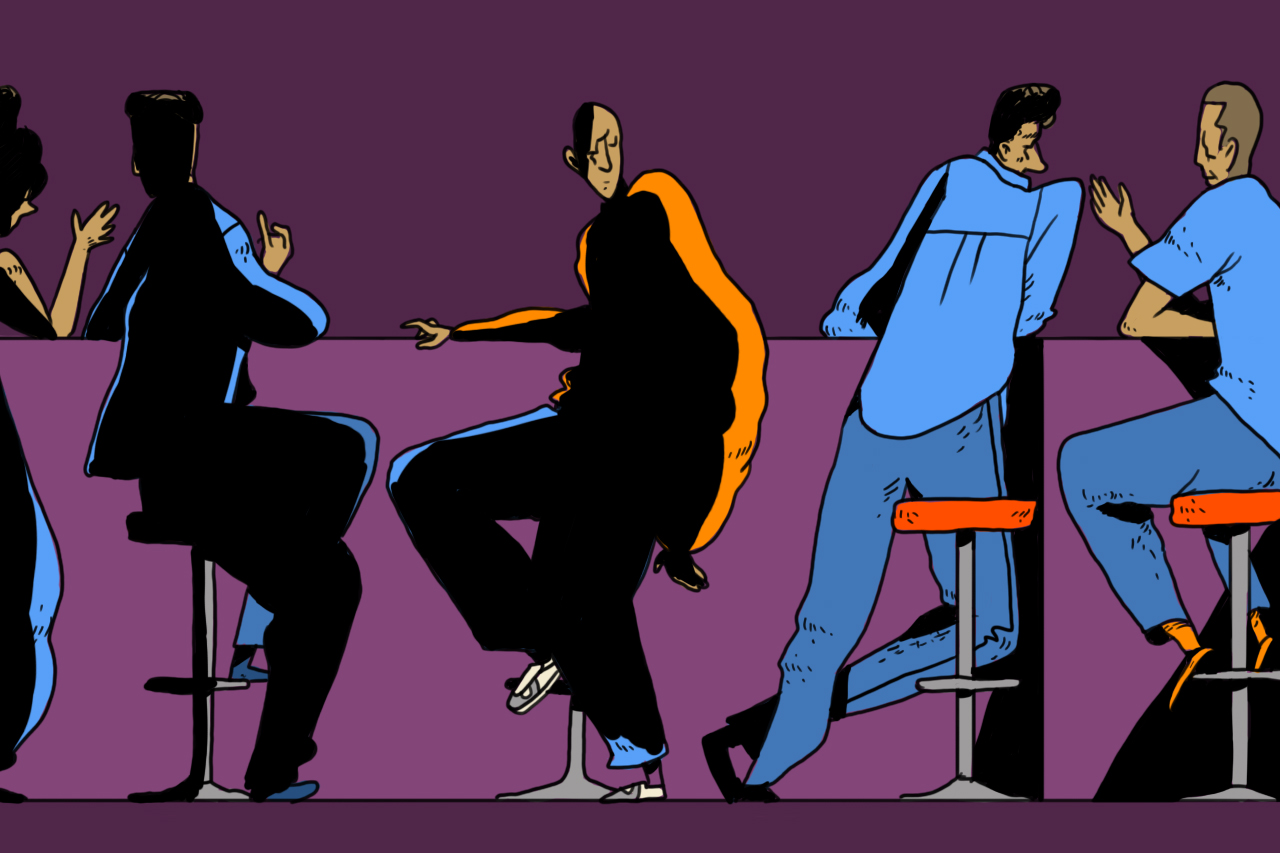Forget romantic relationships. Making friends as an adult is the hardest fucking thing in the world.
We first discover this sobering reality when we leave school for the real world. We learn that we don’t quite know how to maintain the friends we have now that we’re no longer in an environment that enables regular interaction and similar interests.
Add to that the inconvenience and busyness that work brings, and we might realise we simply don’t like someone enough to make the consistent effort.
Perhaps the best and worst thing about friendship is that your friends are not physically or romantically attracted to you, and will never feel obliged to hang out because of ‘girlfriend or boyfriend duties’. With friendship, there is nothing in it for anyone except the genuine joy of being in each other’s company.
Yet for those of us in our late 20s, career, love life, and family understandably take precedence. Our friendships often end up as collateral damage—they are the first thing we ‘cut’ from our lives when we’re short on time, emotions, and energy.
Naturally, we then find it even harder to make new friends. It doesn’t help either that we wrongly assume making new friends means meeting new people in new, potentially intimidating places (i.e., networking).
So if you do want to make new friends, it’s time to look at things differently.
The way I see it, after nearly 30 years of being alive, you already have a whole bunch of ‘new’ friends at your disposal. You don’t need to find a new hobby group on Meetup.com or chat up strangers at random events.
Let me explain: reconnecting with old acquaintances is your best bet at making new friends.
That said, this life hack is trickier than it sounds.
With old acquaintances, you get to enjoy the benefit of a clean slate without actually starting from scratch.
The thing is, acquaintances are both friends and strangers at the same time. While there’s much untapped potential in these unexplored friendships, there’s also already a personal history between the two of you. In many cases, you know of each other. But whether you like what you know is another matter.
So picking up where you’ve left off can feel familiar and awkward. After all, they already fit neatly into a certain category in your life, and the status quo has worked thus far.
At the same time, that dude Peter from secondary school might no longer be the irritating joker who pulled your hair, and is now instead a mature lawyer who enjoys mocking pretentious trends. And Megan might now be a social worker dedicated to helping her underprivileged clients even though you remember her as the mean girl from junior college.
You might actually get along now.
Realising that everyone changes, including yourself, is a good thing. With old acquaintances, you get to enjoy the benefit of a clean slate without actually starting from scratch.
However, this also means redrawing expectations based on who they (and you) now are, instead of who you remember them to be or who you think they should be.
In adult friendships, you inevitably raise the bar for what might have constituted friendship back in school. Beyond typical friendship qualities like trust and support, you now also expect to really like them as human beings before you decide you do want them in your life and that you will make time for them.
Even though it seems that adult friendships are inherently complicated, perhaps we simply become more aware of the nuances involved in platonic friendships as we grow up.

And then there’s the matter of reaching out to someone you haven’t spoken to in a decade.
Do you recall some sordid detail of their past in hopes of finding common ground? Should you feign a professional interest in their work? Or tell them you would like to “catch up” and risk being branded as an insurance agent?
Showing up again in someone’s life after so long can feel contrived, especially if you have to concoct a reason to do it.
Perhaps it’s best then to let this reason happen naturally. Begin with something as simple as privately messaging them after seeing one of their social media posts that resonates with you. Then take the conversation offline once you build rapport.
With old acquaintances, even though you already sort of know them, this fresh interest in their lives can feel as though you’re embarking on something completely new.
And when making new friends, it’s easy to inadvertently lean on the side of either revealing too much and coming off as an oversharer, or remaining too private and therefore seeming like you’re just not worth the effort.
As much as you enjoy this unfamiliar platonic intimacy, the first few months are really a balancing act.
But as every person in a successful adult friendship will tell you, the key to balancing initial enthusiasm and elusiveness isn’t just the individual’s responsibility. Both parties must complement each other’s balance ratio too.
As we quickly learn, frequent meetups and conversations do not automatically translate into a meaningful friendship.
Once you’ve established contact, you’ll realise that just like romantic relationships, making friends as an adult requires taking a leap of faith to bring the existing connection to new depths. Even though most people would naturally advise against being as emotionally invested in friendships, the key to building meaningful ones is to ignore that advice.
So embrace small talk. If done right, small talk cultivates patience and, more importantly, acts as a crucial springboard for the friendship to proceed further.
Cautiously broach ‘sensitive’ topics such as sex and politics within the first few conversations. It’s also a good idea to suss out their values and personal history early on. This can entail everything from their horoscope to where they stand on politics to whether they support overpriced cafe food. Casual things that make or break a friendship, really.
Also embrace honesty. Sometimes you have to open yourself to someone before they do the same. It’s better to show your cards as soon as possible than waste excessive time with a ‘connection’ that leads nowhere.
If you hit it off after revealing more personal details about yourself, the early stages of a newfound friendship can start to feel like a budding romance.
Here is a person who shares similar interests, gets you so well, and holds interesting conversations you never seem to tire of. Unlike the friends you meet out of obligation or shared history, this person is relevant to who and where you are in life right now.
If platonic love were a thing, you are head over heels in it.
But as we quickly learn, frequent meetups and conversations do not automatically translate into a lasting friendship. As you’re trying to figure out an old acquaintance, they have every right to do the same with you too.
And so you should be prepared to lose. This, however, should never be considered a failure on anyone’s part.
Finally, the best thing about deciding a friendship just doesn’t work is that both parties can fall back into the background of each other’s lives without much difficulty. On one hand, you realise that even after hanging out more frequently, you’re still indifferent to their company. You don’t feel bad either, because it’s not as if they’ll vanish from your life. There’s no drama, because there was no significance.
Making friends as an adult sounds like a herculean feat because none of this is supposed to be easy. It’s an investment—it may not kick off with the first friend you try to make, and may not even after a few tries.
Still, would you rather go through the motions with friends who have stopped meaning anything to you, or find meaningful companionship in people you actually look forward to spending time with?
The answer should be obvious.
We already understand that not everything hard is worth doing, but the things worth doing are almost always hard.






